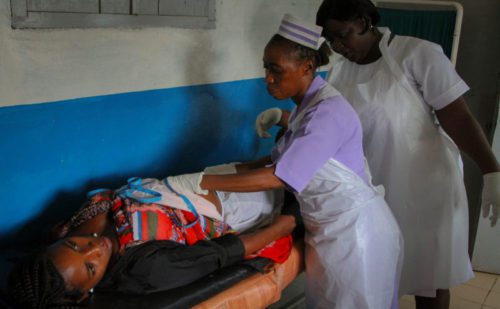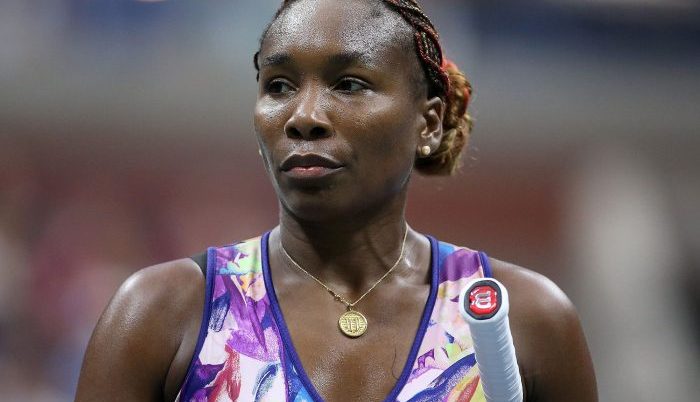After she registered at the TBA, the Baba in charge of the home gave her some substance and directed her on how and when to take it. Also, he informed her on the days she wouldbe visiting the home, which she adhered to strictly. Besides, the sister in-law had earlier advised her to take heed to all the instructions given to her by the Baba.
When the pregnancy was 28 weeks, she was given a concoction called Aseje and also some crushed dried leaves, which she was asked to add in pap each time she wanted to drink for easy delivery.
At 30 weeks, she was given black soap for bathing. When labour started, she went to the TBA to deliver and for more than three days, Omolara was in labour, when the Baba discovered that he could not help the situation, he asked the husband to take her home and bring her back to the home in two days’ time.
It was then it dawned on the husband to take Omolara to the hospital as conditions were getting out of hand. On getting there, she was taken straight to the theater for Caesarean Section (CS). It was during the operation that it was discovered that the child had long died in the womb due to prolonged labour that would have been avoided through CS. Sadly, Omolara died a few hours later.
These are all familiar stories that have become the lot of pregnant women who visit unskilled TBAs where there are no Gynecologists, nurses, neither ante-natal nor post-natal care in Nigeria. But in some cases where there are doctors, they still go to TBAs because of their traditional beliefs.
According to statistics, a woman dies while giving birth in Nigeria every 15 minutes. About 630 women die out of every 100,000 live births in Nigeria, the second highest maternal mortality rate in the world, according to the World Health Organisation (WHO).
The figure is as high as 1,100 in northern Nigeria and rural communities where women are less educated and access to health is even worse, WHO says, blaming simple mistakes, wrong diagnosis, carelessness, incompetence of staff and lack of access to prompt and affordable healthcare.
Investigation revealed that most pregnant women particularly from the Southern part of Nigeria prefer to use trado-medical facilities because they see it as part of their culture. It’s also affordable.
Majority of women from the Southern part of the country who spoke in an interview affirmed that they prefer giving birth at TBAs because it was there their own mothers gave birth to them. Grace Ajani, a mother of six, told The Next Edition, that none of her kids was delivered in the hospital. “I just prefer to have my children in a traditional home because the people there are friendly and they know what to do at any time,” she said in between smiles.
While Grace prefers to visit a TBAs’ home, Eno prefers to have her children in church. She explained “To me church is safer because the prophet can tell you in advance the issues to tackle before your due date.” These are the major issues, and indeed, choices that militate against safe delivery in Nigeria.
Recognising, therefore, that TBAs as part of the birthing process are the preferred service providers for delivery in rural communities and even in urban centres over the formal health facilities even though they are usually self-taught or informally trained, the Lagos State government recently initiated the General Hospitals Immersion Programme in which the TBAs undergo to build their capacity for greater and efficient healthcare delivery.
Speaking while presenting certificates to such TBAs recently in Lagos, Akinwunmi Ambode, the state governor described Nigeria as a nation with weak midwifery services and inadequate human resources for healthcare delivery and added that there was urgent need to improve the skills of TBAs as part of a strategy to reduce infant mortality and improve maternal health.
Ambode further explained that majority of maternal and Neo-natal deaths are preventable if appropriate care is provided in timely manner.
On the need for capacity building of TBAs, Gov. Ambode said the shortage of human resources was a challenge that required a new strategic thinking.
On the preference of TBAs by rural dwellers, the Minister of Health, Prof. Isaac Adewole once said that traditional healers were competitors of orthodox medicine practitioners and that the only way to really create a change in orthodox medicine “is for us to offer better services, show more care, and more compassion. Let us be honest, traditional healers communicate better with our people,” he said.
“The average Nigerian who patronises them does not see them as arrogant, but people complain about the negative attitude of our nurses. So, we (orthodox medicine practitioners) need to change that perspective.
“We, orthodox medicine providers, also need to make care services affordable. Some years back, baby delivery in my church was N300.
“At that time, in University College Hospital, UCH, Ibadan in Oyo State, antenatal care was N18,000. So, people would line up in the church. We need to make care services affordable; we need to show compassion; we need to show care and really recognise that we have competitors. If we don’t, patients wouldn’t come to us, even though we are doing something greater and better,” the Health Minister said.
Speaking in an interview with a Traditional Midwifery registered with Lagos State Board of Traditional Medicine, Prince Olusesi Tajudeen expressed his annoyance over some misconceptions about their profession, which he attributed to rivalry between them and the orthodox medicine practitioners.
Tajudeen who is also the President of Association of Traditional Midwifery of Nigeria said: “World Health Organisation (WHO) recognises us as traditional midwifery, but due to the rivalry between us and the orthodox medicine practitioners, they call us Traditional Birth Attendants. We are Traditional Midwives because we are close and dear to our community. In the Lagos State Board of Traditional Medicine, we have department for Orthopedic and psychiatrics, among others.
“Lagos State Government looked at all these departments and fields and asked which one was more valuable and they found out that it was traditional birth attendants.
“At times when you ask some people to go to the hospital to give birth, they say no, ‘we want to visit our traditional birth attendants because it has mysteries; first spiritually, second due to our culture and three beliefs of our people. They believe that there are something we can do that the orthodox cannot do.”
And what are those things? He said, “number one, in Africa, they could tie pregnancy spiritually and the person would not be able to be delivered of the baby. Even if they do CS on the person, she would die. But through deliverance, the person would be saved.
“Number two, let’s say that the pregnant woman has complications, the orthodox practitioners would go for Caesarean Section. They will operate on the women. But here we have soaps, we have powders that work in a miraculous way that the women would take. It is what we have used for years. There are medical doctors that have challenged this and later they come to believe in it. It is genuine.
“God has blessed herbs and roots. That is why I have always said we should go back to nature because God has given us nature. Some years back, officials from the Akwa Ibom State Ministry of Health came to Lagos to learn how we are doing it and my office was one of the places they visited. My office was one of the case studies. They stayed here with their officials and we showed them some herbs and how we are doing it.
“We pray for them too. We too have our own method of praying. But one thing is clear; it is not every one of us that believes in traditional religion; some are Muslims and some are Christians.
“Just because we are doing it and everybody will believe that all practitioners are idol worshippers. Not all traditional medicine practitioners are idol worshippers. Once you mention traditional medicine, people would think cultism or idol worshipping is involved.
“Traditional medical practice is not a religion; it is a profession. But if you are a Muslim, you take it from Islamic way and if you are a Christian, you take it Christian way. The same thing applies if you are a traditionalist,” Tajudeen explained.
Contrary to the belief by some people that herbs could have adverse effects on newborn, Tajudeen said that there was nothing that God created that could have adverse effect if well taken. “If you take water too much, it will have adverse effect; if you take food too much, it becomes poison. When you pass through training, you will know the kind of herbs that you will administer on a pregnant woman at different levels of the pregnancy. There are some of the herbs that you cannot give to women whose pregnancies are still at early stages,” he added.
But he pointed accusing fingers at auxiliary nurses, trained by unregistered private (traditional) hospitals, saying they were the culprits giving them a bad name.
To save Nigerian women from themselves, various governments need to co-opt TBAs into the mainstream of midwifery services.












